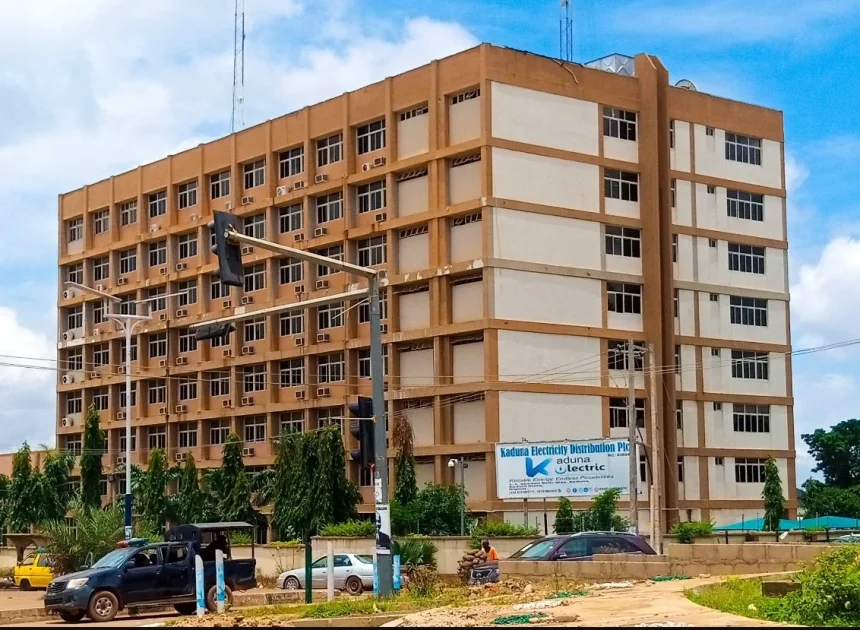Kaduna Electric, an electricity distribution company (KAEDC), says the claim that it owes N600m in unpaid taxes by the state’s internal revenue service (KADIRS) is untrue.
The Kaduna Internal Revenue Service (KADIRS) had, on August 2, sealed the distribution company’s (DisCo) headquarters over the N600 million unpaid tax.
Zakari Muhammad, head of corporate communications at KADIRS, said the company was sealed after it obtained a court order.
This was hours after the DisCo announced the disconnection of power supply to the government house and other state facilities over a N2.9 billion debt.
Speaking on the tax debt in a statement Saturday, Kaduna Electric accused the state government of resorting to “cheap blackmail” after failing to pay the debt.
The DisCo also said it owes less than N400 million (instead of N600m) and has been adhering to an agreement to pay N20 million monthly since January 2024.
“In a surprising turn of events, Kaduna Electric has found its headquarters in the state capital shut down by the Kaduna Internal Revenue Service. Kaduna IRS claims this action is due to the company’s outstanding tax liabilities.
“Kaduna Electric is surprised by this development, the Company had demanded for payment of which the state government failed to honor for the last 6 months thus resulting to cheap black-mail, which is uncalled for and unnecessary.
“We stand by the fact that they have not paid a dime to Kaduna Electric for electricity consumed since January 2024 resulting in debt of N1.16billion, with a total outstanding of N2.9bil.
“The claim of liability of N600mil by Kaduna Electric is untrue, the Company owe less than N400mil with an agreement to pay N20mil monthly, these payments have been honoured by the Utility since January 2024.
“Since coming onboard of the new Management back in January, demonstrating its commitment to resolving all tax-related matters responsibly is up to date with payments including statutory monthly tax payments as well as settlement arrangements with the Kaduna Inland Revenue Service.
“Despite these efforts, the government has taken the drastic step of locking down the head-quarters, including the crucial command and control centre, which is integral to the company’s operations.
“The closure has had a significant impact on Kaduna Electric’s ability to maintain full operational control. The dispatch centre, essential for coordinating power supply, is now under lock and key,” the statement reads.
The DisCo said it has activated its disaster recovery plan to continue operations, but noted that the contingency measure limits its visibility and control over its network — raising concerns about supply safety.
The company assured the public that it is making efforts to maintain electricity supply, “especially during this time of national distress”.
“We are committed to ensuring that our customers receive uninterrupted power despite these hurdles,” Abdulazeez Abdullahi, KAEDC’s head of communications said.
‘COURT ORDER TO SEAL HEADQUARTERS LACKS JURISDICTION’
Raising legal concerns about the shutdown, the DisCo said the court order obtained by the KADIRS to seal its headquarters lacks jurisdiction.
“Matters of tax are to be heard by the Tax Appeal Tribunal, a specialised court. Moreover, it is illegal to distrain property for personal income tax, a point underscored by the company’s legal team. Northwistanding, the Company shall be in obeyance of this order,” the statement further reads.
“The ongoing issue of non-payment for electricity by the Kaduna State Government significantly affects the entire electricity value chain, from generation companies to gas producers and the Transmission Company of Nigeria (TCN), which are all vital for ensuring a stable power supply.”
KAEDC urged customers to keep supporting the company by buying prepaid meter tokens through its online and mobile platforms, especially those unable to reach the cash office at its headquarters in Kaduna.
The company expressed hope that with public support and prompt payment for electricity usage, it can overcome “this challenging period and continue delivering essential services to the public”.






